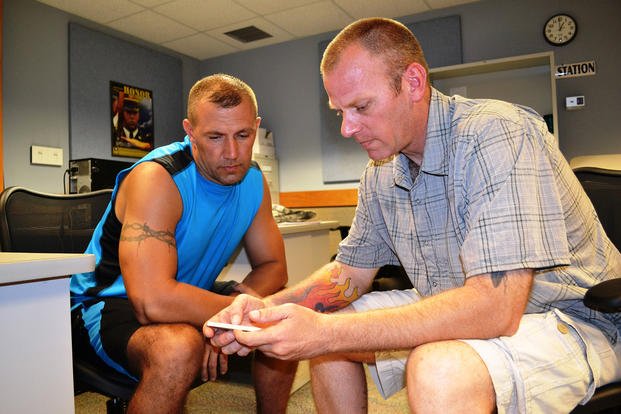While the men and women of the American armed forces are driving tanks, fixing jet engines and steering battleships into tight turns, many of their competitors for civilian jobs are going through the rigors of interviewing for positions, honing their resumes and learning the nuances of networking and office politics.
Although manning missile defense and laser-guided rocket systems has prepared the nation's military personnel to command any theater of war, there's still one battle zone in which they have the potential to find themselves outgunned -- the American job market.
Luckily, the American military is nothing, if not thorough. Realizing most members of the armed forces will have been out of job-hunting practice for an extended period, the Department of Defense (DoD) has set up an extensive network of career services designed to make sure service members are up to date on modern job-hunting practices when they transition back to civilian life.
For instance, the Army Career and Alumni Program (ACAP) offers a two- to four-day program that runs soldiers through the career preparation options available before they are discharged.
"It's a very popular program," said Joan Shartzer, a regional ACAP coordinator based in Fort Knox, Kentucky. And for many transitioning service members, it's their first experience with looking for a traditional job. "A lot of the individuals we work with have never had a job outside the military," Shartzer said.
Built on money provided by the DoD, the Army has designed a suite of its own career-enhancing tools, including resume and cover letter-writing software made specifically for transitioning soldiers, software to help soldiers research career interests and tutorials about relating military skills to civilian jobs. ACAP also provides a library of model interviews on video that transitioning personnel can view to learn about interviews for jobs in specific industries.
In addition to this, ACAP sets up job fairs and career events, provides one-on-one career counseling and even has its own online job-searching website catering to employers looking for workers with military skills. "The whole workshop, followed by these tools, is the most powerful part of ACAP," Shartzer said.
The transition service programs for all four branches of the military are somewhat similar, but each was individually developed specifically for its type of personnel: soldiers, sailors, airmen and Marines.
As deep as the resources for transitioning military members may seem to be, some feel the program still has to evolve to include more civilian resources before it will be truly effective.
"There's no real public/private partnership between the military and the civilian [career services] world," said Todd Weiler, former principal deputy assistant secretary of the Army for manpower and reserve affairs. A decorated Cobra attack helicopter pilot in the first Gulf War, Weiler says the career services available to him when he returned in 1991 were lacking.
"When I transitioned out, there really wasn't any formal program to help you transition from the military," he said. Career assistance existed, but there was "not much there."
After transitioning, Weiler worked on improving those services from his former post as a defense department official. Now a senior associate with the consulting firm Arrowpoint Corporation, which does defense consulting for Monster, Weiler says the future of career services for transitioning personnel should include more interaction with experts in the civilian job-searching realm and contact with industries looking to hire former service members. He is working to pilot new programs that will break the Army's mindset of relying completely on its own resources for career services.
According to Weiler, the ideal career service package for transitioning personnel would rely on three elements working together:
- Academic education services on military bases;
- Civilian career, resume and job-searching specialists;
- Companies specifically looking to hire transitioning candidates.
"It's sort of a three-legged stool, if you will," Weiler said.
Better career services, including improved help on creating a "civilianized" resume and localized job databases for transitioning armed service personnel, will also eventually help military branches with future retention and recruiting efforts for the Reserves and National Guard. Helping personnel find jobs keeps the Army in good favor with former members and keeps them involved in the Guard and Reserve.
"You're investing in your marketing future," Weiler said.
Find the Right Veteran Job
Whether you want to polish your resume, find veteran job fairs in your area or connect with employers looking to hire veterans, Military.com can help. Subscribe to Military.com to have job postings, guides and advice, and more delivered directly to your inbox.











